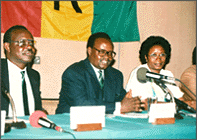*
* *
A
few months after the genocide, the UN Security Council set up a war
crimes tribunal to prosecute those responsible for committing the
atrocities in Rwanda. It goes without saying that many Rwandans, myself
included, had felt betrayed by the United Nations inaction before
and during the genocide. Nonetheless, I had high expectations for
the International Criminal Tribunal for Rwanda (ICTR). However, I
was to be sorely disappointed.
| To
begin with, the United Nations established the Tribunal not
in Rwanda where victims of the genocide could follow proceedings,
but across the border in Arusha, Tanzania. Although this was
done for security reasons, the remoteness meant that ordinary
Rwandans would remain totally unaware of the legal process taking
place. To make matters worse, the Tribunal announced that it
planned to conduct its trials in English and French, not Kinyarwanda,
so that even if Rwandans wanted to follow the trials, they could
not. Thus it seemed the ICTR was operating with total disregard
for the very people it was meant to serve by ignoring our language
and culture, not to mention our feelings toward the United Nations. |

1st
official meeting of the Liberal Party of Rwanda - founding members,
1991.
left to right: Louise's brother Lando,
Justin Mugenzi (in custody of ICTR),
Agnes Ntamabyaliro (in Kigali prison).
Courtesy
Louise Mushikiwabo |
Nonetheless, I was thrilled when, a year after its creation, the ICTR
issued its first indictments. Even more heartening was that unlike
the UN Tribunal for the former Yugoslavia, the ICTR was actually able
to gain custody of much of the Hutu leadership responsible for the
genocide. However, my fellow Rwandans and I were appalled when we
heard about how the accused would be treated in UN custody. At a time
when most Rwandans were living in poverty and struggling just to get
enough to eat every day, those responsible for the genocide were living
in spotlessly clean facilities, were served three meals a day, and
had access to telephones, the Internet, and a gym. Moreover, we were
told that the accused enjoyed a principle called "presumption of innocence,"
and therefore should not be called "prisoners." We also
learned that their families were given UN protection.
Sometime in 1999, Radio Rwanda announced that the ICTR was going to
release Jean-Bosco Barayagwiza, one of the masterminds of the genocide.
Apparently the United Nations had violated his rights by holding him
in detention for too long before he was able to appear before the
court. I could not even dare explain what that meant to many friends
and relatives in Rwanda who called and wrote to ask me what was going
on. The United Nations had done nothing to protect us from the Interahamwe’s
deadly rampage, and now it was releasing one of the men responsible
for it. For me, Barayagwiza’s release held a particular irony
because I had successfully sued him in Federal District Court in New
York back in May 1994, under the Alien
Tort Claims Act, with the help of Human Rights Watch. I was able
to pursue some form of justice through the American courts, yet a
court set up by the United Nations specifically to prosecute war crimes
in Rwanda seemed unable to mete out justice.
|


